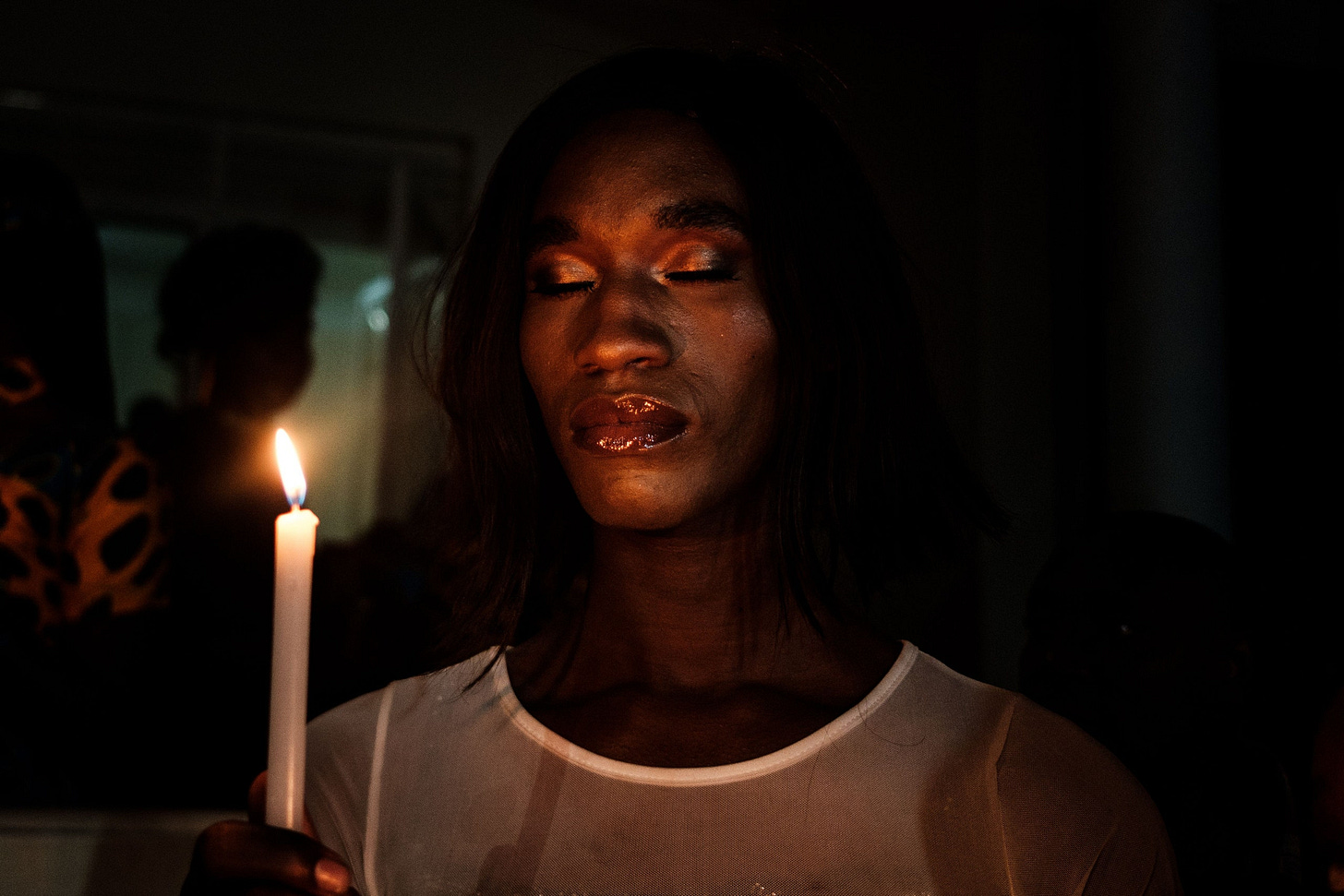Global Roundup: Transgender Day of Remembrance Edition
Compiled and written by Miriam Batal
Sumy Sadruni/Getty Images Via them.com
At Least 350 Transgender People Have Been Killed Globally in 2020
CW: This article contains anti-trans hate violence. This can be upsetting or triggering since folks might have directly or indirectly experienced such violence or been affected by it. If ever you feel the need to reach out, please do and know that you are strong.
This past Friday, November 20, was Transgender Day of Remembrance. Data indicate that 2020 continues to be one of the deadliest years on record for hate violence against trans and gender nonconforming people.
Between the beginning of October 2019 and the end of September 2020, at least 350 transgender and gender-diverse folks were murdered, according to data obtained by Transrespect Versus Transphobia Worldwide (TvT), a study arm of the Transgender Europe advocacy network, which measures that period annually via their Trans Murder Monitoring initiative. The number marks a 6 percent rise in recorded killings from their tally in 2019, when 331 trans and gender nonconforming folks lost their lives due to hate crimes.
TvT said the pandemic had exacerbated already existing inequalities and worsened violence that the trans and gender nonconforming communities were subjected to.
As a consequence of the COVID-19 pandemic, as well as growing racism and police brutality, the lives of trans and gender-diverse people are at even greater risk. Data is a testimony of how COVID-19 is disproportionately impacting trans people worldwide, especially those most marginalized, such as Black and women of colour, sex workers, migrants, youth, and poor.Although COVID-19 affects us all, social differences and inequalities are deepened by the pandemic, emphasizing gaps in lack of legislation and systemic protection of trans and gender-diverse people - TvT
Brazil recorded the highest number of murders of any country, with 152 trans people killed over the time period tracked. Of the 75 countries tracked in the survey, Mexico and the United States ranked #2 and #3 in the total number of anti-trans homicides, with 57 and 28, respectively.
Research by TvT reveals that 98% of those murdered internationally were trans women or transfeminine persons. Moreover, during the period they analyzed, persons of colour make up 79% of trans folks murdered in the United States. Thirty-eight percent of the killings happened in the streets as investigated internationally, while 22% of the cases took place in the house of the killer. The average age of those killed is 31 years old, with 15 years old being the youngest victim.
HOWEVER, IT IS IMPORTANT TO NOTE the statistics are not detailed, since they only include incidents uncovered online and those documented by local advocates and affiliate groups to TvT. The public is not aware of many incidents of anti-trans killings and they are unreported or misreported, with many suspects being dead-named and misgendered.
Transgender Day of Remembrance is an annual observance launched in 1999 by trans advocate Gwendolyn Ann Smith as a vigil to honor the memory of Rita Hester, a trans woman who was killed in 1998.
———————-
Aamir Qureshi/Getty Images Via them.com
A new initiative in Karachi is building Pakistan’s first privately managed public toilets out of old shipping containers with an emphasis on ensuring fair access to sanitation for women, disabled persons and the transgender community.
The Salman Sufi Foundation plans to build 500 new public bathrooms within the next three years. The first toilet in Karachi, Pakistan's largest city, was constructed in September. Each facility is separated by gender into two parts and provides stations for hand-washing, toilet paper, soap, and hand dryers. In Pakistan, there are no clear choices for third-gender citizens, known as "khawaja sehras". Salman Sufi, the president and namesake of the Salman Sufi Foundation, said that the project was inspired by the “pressing sanitation needs” of women across the country, who are sometimes forced to bring their children with them into restrooms that may be harmful for their health.
[I]'s very hard for them to go to work and maintain their health as well. I have heard stories of women who don’t eat when they go to public places as there are just no bathrooms for them. Some have also contracted urinary tract infections from dirty bathrooms – Salman Sufi, the president and namesake of the Salman Sufi Foundation
About 40% of Pakistan’s population of roughly 208 million have no access to a clean restroom, according to the international non-governmental group Wateraid, causing 11.5 percent of civilians to openly defecate.
The lack of access to sanitary facilities overwhelmingly impacts the country's women and transgender people, the latter of whom are often subject to regular abuse and aggression. In addition, people with periods experience problems with their menstrual health because of the lack of sanitized products and clean places.
The program is one of several recent reforms aimed at improving conditions for Pakistan’s often marginalized trans community. A landmark bill in 2018 allowed transgender people to self-identify their gender on passports, driver’s licenses, and official IDs and stipulated that it is illegal to deprive trans individuals of their fundamental voting rights. The country also opened its first senior housing for third-gender individuals last year.
——————————
NUNU STANDS IN A DOORWAY IN KIGALI'S NYAMIRAMBO NEIGHBORHOOD. (MAGGIE ANDRESEN FOR VICE WORLD NEWS)
CW: This article contains transphobia and violence against trans women. This can be upsetting or triggering since folks might have directly or indirectly been affected. If ever you feel the need to reach out, please do and know that you are strong.
Although Rwanda’s record on LGBTQ rights outperforms its neighbors, legal security is not assured for its LGBTQ population. While transgender people in Rwanda are unlikely to be charged with a crime based on their ethnicity or gender identity, they are often persecuted by law enforcement and held in facilities that lack oversight for an indeterminate period of time.
Homosexuality is not criminalized in Rwanda, but many LGBTI people keep their sexuality and gender identity secret in an attempt to avoid rejection, discrimination and abuse, which in the long run inevitably denies them their basic human rights. This has led many more to choose to silence when faced with injustice – Nizeyimana Seleman, executive director of Hope And Care Organization
Nunu (whose name has been changed in this article in order to protect her safety), a young trans woman, was arrested three times in 2018 and 2019 at the Gikondo Center. The Gikondo Center is a facility that temporarily houses and rehabilitates persons experiencing "deviant acts or behaviours,” according to a government letter of intent.
Dr. Aflodis Kagaba, who runs the Health Development Initiative, a Rwandan non-profit organization working to advance healthcare for vulnerable communities including LGBTQ, sex workers, and women seeking safe abortions, says that of all the identities represented under the LGBTQ umbrella, transgender Rwandans face the highest stigma.
In July, the Great Lakes Initiative for Human Development secured a 24 hour toll-free number for wrongfully arrested LGBTQ Rwandans. The hotline was funded by UNAIDS in partnership with the Rwanda Biomedical Center. Since July, five transgender people have used the hotline following their arrest by police. All were released.
———————————
Mark Kolbe/Getty Images Via them.com
As many sporting associations continue to consider their policies on trans, non-binary, and intersex athletes, following years of facing obstacles related to sexism in athletics, Caster Semenya is taking the fight a step further. The Olympic gold medallist will challenge the regulation of World Athletics at the European Court of Human Rights after the international track and field governing body moved to regulate the level of testosterone in female athletes.
[I] refuse to let World Athletics drug me or stop me from being who I am. Excluding female athletes or endangering our health solely because of our natural abilities puts World Athletics on the wrong side of history – Caster Semenya
In 2018, World Athletics passed rules authorizing women athletes with "differences in sexual development" to decrease testosterone levels by surgical treatments to participate in the 400-meter, 800-meter, 1500-meter and 1-mile races. Semenya, a South African intersex cisgender woman, was assigned female at birth and naturally has higher levels of testosterone. The policy reform in consequence limits Semenya from participating in many sports.
Because of the regulation, in the 800-meter race at the Tokyo 2021 Olympic Games, Semenya will be ineligible to qualify for a third consecutive Olympic gold medal. In the meantime, as the LGBTQ+ website Outsports reports, she's practising to run in the 200-meter sprint.
—————————
Are you wondering what can you possibly watch next? Well, you might be in luck because the amazing, sex-positive, sex worker duo Rebecca More and Sophie Anderson known as the Cock Destroyers have a new FREE show coming November 27: Slag Wars: The Next Destroyer. The show follows the internet icons on a search to find the next queer sex symbol.
ChaseIcon, a trans woman, comedian and singer who is perhaps best known for her viral voiceover videos where she pokes fun at celebrities such as Kylie Jenner and Lady Gaga, will be the host and narrator of Slag Wars. The show is described as safe for work, so there’s no sex or nudity, and it stars a group of sex workers and adult models. When asked if the world is ready to see sex workers in a new light, Icon gave an iconic answer.
I don’t think it matters if we’re ready for this conversation. We’re just gonna have it! Sex work is so common, and it’s how a lot of people in the LGBTQIA+ community make their money. It’s not something to be ashamed of or silenced [for]. I mean, Slag Wars is literally gonna be a cultural reset. Twitter will never be the same - ChaseIcon
If you haven’t watched the iconic trailer for Slag Wars watch it here!
——————————
Miriam Batal (she/they) is a completing their fourth-year undergraduate bachelor’s degree with a major in World Cinemas and minor in Feminist and Gender studies at the University of Ottawa. They are out and proud queer Lebanese – Canadian, they are abled-bodied, a settler of colour, intersectional feminist, body positivity, sex-positive, pro-sex worker, fully bilingual (French and English) person who lives on Turtle Island (Canada). She currently sits on the uOPride Executive team.
They are passionate about human rights, social justice and accessible mental health services and treatments. They are tired of cis white heterosexual men running politics and making decisions on their body and sexuality. They would like one day to make a positive change to this heteronormative world. When they are not protesting, or reading on queer theory/literature, Miriam enjoys spending time with their friends, going to the museum, attending drag shows, queer art exhibit, cinema and the theatre (pre-pandemic nonetheless) and video games.
They firmly believe that with education whether it be in academia or through lived experiences and conversation we are able to defeat ignorance, the patriarchy, colonialism and injustices.








